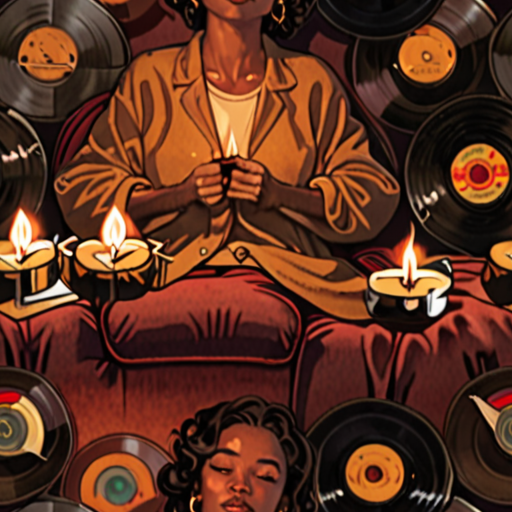For decades, soul music has been a cornerstone of American culture, providing a soundtrack for generations of artists, musicians, and everyday people alike. At its core, soul music is a genre that speaks directly to the heart, conveying raw emotion and vulnerability through its lyrics. From the classic hits of Lee Brice to the timeless ballads of iconic artists like Ray Charles, who performed gospel in church while growing up, soul music has a way of tapping into our deepest feelings and desires.

The Message of Soul Music
Soul music is deeply rooted in African-American identity and culture, reflecting the struggles, hopes, and experiences of black people during the Civil Rights Movement.
- It emerged in the late 1950s and early 1960s as a genre that combined elements of gospel, blues, jazz, and rhythm and blues to create a unique sound that spoke to the hearts of African-Americans.
- Soul music was characterized by its emotive, heartfelt lyrics and powerful vocal performances, which conveyed messages of love, freedom, and social justice.
- Artists like Aretha Franklin, James Brown, and Sam Cooke became icons of the genre, using their music to express the frustrations and aspirations of African-Americans during a time of great social change.
- Soul music played a significant role in shaping American popular culture, influencing the development of rock, funk, and hip-hop, and paving the way for future generations of musicians.
Key Themes and Messages
Soul music addressed a range of themes and issues, including:
- Racism and inequality: Songs like “A Change Is Gonna Come” and “Respect” reflected the struggles faced by African-Americans in a society marked by racial segregation and discrimination.
- Love and relationships: Soul music often explored the complexities of romantic love, heartbreak, and relationships, as seen in songs like “I’ll Take You There” and “Papa Was a Rolling Stone.”
- Freedom and empowerment: Soul music celebrated the struggle for freedom and self-expression, as embodied in songs like “We Shall Overcome” and “Say It Loud – I’m Black and I’m Proud.”
- Spirituality and faith: Many soul artists drew on their Christian faith to create music that was both personal and universal, as seen in songs like “Take Me to the King” and “This Little Light of Mine.”
Influence and Legacy
Soul music has had a profound influence on popular culture, inspiring countless artists and genres, from rock and roll to hip-hop and R&B.
Its legacy can be heard in the work of artists like Marvin Gaye, Stevie Wonder, and Prince, who built upon the foundations laid by soul pioneers like Ray Charles and Sam Cooke.
Today, soul music continues to evolve, incorporating new styles and influences while remaining true to its core values of emotional authenticity and social consciousness.
Key Elements of Soul Music
Soul music is a genre characterized by its emotional intensity, vocal expression, and rhythmic groove.
-
The Twelve-Bar Form
The twelve-bar form is a fundamental element of soul music, derived from the blues tradition. This structural framework typically consists of three lines of lyrics, often with a repeating pattern of chords and melodies.
-
Call and Response
Call and response is another essential aspect of soul music, where a singer or instrumentalist initiates a phrase, followed by another vocalist or instrumentalist responding with a complementary phrase.
-
Vocal Expression
Soul music emphasizes powerful, emotive vocals, often conveying personal experiences, social commentary, and spiritual themes. Vocalists frequently employ techniques like melisma, vibrato, and phrasing to convey emotional depth.
-
Rhythmic Groove
A strong rhythmic foundation is crucial in soul music, often featuring syncopated rhythms, polyrhythms, and percussive elements. This creates a sense of tension and release, propelling the listener through the song.
-
Instrumentation
Soul music frequently incorporates a range of instruments, including keyboards, guitars, bass, drums, and horns. These instruments work together to create a rich, layered sound that underscores the emotional intensity of the vocals.
-
Harmony and Melody
Soul music often employs complex harmonies and melodies, drawing from gospel, jazz, and R&B traditions. These harmonic and melodic elements contribute to the genre’s distinctive sound and emotional resonance.
-
Lyrics and Storytelling
Soul music frequently focuses on storytelling, with lyrics addressing themes like love, heartache, social justice, and personal struggle. These narratives often resonate with listeners on a deep level, fostering a connection between the artist and audience.

The Meaning of Soul Song
Soul music is a genre of music that originated in the African-American community in the United States during the late 1950s and early 1960s. It is characterized by its emotional intensity, heartfelt lyrics, and a strong emphasis on rhythm and blues. At its core, soul music is a reflection of the human experience, with songs that express deep feelings of love, loss, joy, and struggle. As a genre, soul music has evolved over the years, incorporating various styles and influences, but its essence remains rooted in the raw emotion and authenticity of its artists.
Key Characteristics of Soul Music
Some of the key characteristics of soul music include:
- A strong emphasis on vocal performance, with singers often pouring their hearts out through powerful, emotive vocals.
- A focus on storytelling, with songs often telling stories of love, heartbreak, and social justice.
- A blend of gospel, blues, and R&B influences, which gives soul music its unique sound and feel.
- A sense of urgency and passion, with songs often conveying a sense of desperation and longing.
- A commitment to social justice and equality, with many soul artists using their music as a platform to speak out against racism and inequality.
The Evolution of Soul Music
Over the years, soul music has undergone significant changes and transformations, influenced by various factors such as technological advancements, cultural shifts, and artistic innovation. Some notable developments in the evolution of soul music include:
- The rise of Motown Records in the 1960s, which helped to popularize soul music and launch the careers of iconic artists such as Stevie Wonder and Marvin Gaye.
- The emergence of psychedelic soul in the late 1960s and early 1970s, which saw artists experimenting with new sounds and styles, such as Jimi Hendrix and Sly and the Family Stone.
- The development of funk and disco in the 1970s, which further pushed the boundaries of soul music and paved the way for future generations of artists.
- The resurgence of soul music in the 1980s and 1990s, with artists such as Prince and D’Angelo helping to revive the genre and introduce it to new audiences.
Soul Music Today
Despite the many changes and challenges it has faced over the years, soul music remains a vital and vibrant genre, with a new generation of artists continuing to push its boundaries and explore its possibilities. From the likes of Anderson.Paak and The Weeknd to the emerging talents of artists such as Lucky Daye and Yola, soul music continues to evolve and thrive, offering a powerful and enduring expression of the human experience.
What Does Soul Music Say About You?
Soul music has long been a reflection of our emotions, experiences, and personalities.
- For those who appreciate soul music, it often indicates a strong sense of creativity, intelligence, and confidence.
- Individuals drawn to soul music may possess a deep understanding of human emotions and a desire to connect with others on a deeper level.
- The genre’s emphasis on storytelling and emotional expression can suggest a empathetic and compassionate nature.
Exploring the Connection Between Soul Music and Personality Traits
Research suggests that people who enjoy soul music tend to have certain personality traits in common, including:
- High levels of extraversion, indicating a preference for social interaction and a desire to express oneself through music.
- A strong sense of self-esteem, reflecting a positive self-image and confidence in one’s abilities.
- Creativity and intelligence, suggesting a curious and imaginative approach to life.
Understanding the Cultural Significance of Soul Music
Soul music has played a significant role in shaping American culture, particularly during the Civil Rights Movement of the 1960s.
- The genre’s powerful lyrics and melodies helped to amplify messages of love, equality, and justice.
- Soul music continues to influence contemporary artists, with many drawing inspiration from its rich musical heritage.
- The genre’s enduring popularity reflects its ability to evoke strong emotions and connections among listeners.
Embracing the Spirit of Soul Music
Whether you’re a longtime fan or just discovering the genre, soul music has something to offer everyone.
- Its emotive soundscapes and heartfelt lyrics invite listeners to reflect on their own experiences and emotions.
- The genre’s legacy continues to inspire new generations of musicians and fans alike.
- Soul music remains a powerful force in shaping our cultural identity and fostering empathy and understanding.
Why Is Soul Music So Powerful?
Soul music has been a cornerstone of African American culture since its inception, speaking directly to the hearts and minds of generations.
- The genre’s raw emotion, heartfelt lyrics, and infectious rhythms have captivated audiences worldwide, transcending racial and geographical boundaries.
- Soul music’s power lies in its ability to evoke emotions, spark conversations, and bring people together through shared experiences.
The Evolution of Soul Music
Soul music emerged in the 1950s and 60s, influenced by gospel, blues, and R&B. Artists like Ray Charles, Sam Cooke, and Aretha Franklin pioneered the genre, laying the groundwork for future legends.
- Early Soul Music: Characterized by its emotive vocals, simple harmonies, and driving rhythms, early soul music set the stage for the genre’s growth.
- Motown Era: Berry Gordy’s Motown Records revolutionized the music industry, producing iconic artists like Stevie Wonder, Marvin Gaye, and Diana Ross.
- Funky Soul: As the 70s approached, soul music incorporated funk and disco elements, resulting in hits like Earth, Wind & Fire’s “September” and Al Green’s “Let’s Stay Together.”
The Impact of Soul Music
Soul music has had a profound influence on popular culture, shaping the course of music history and inspiring countless artists across genres.
- Cultural Significance: Soul music played a pivotal role in the Civil Rights Movement, providing a soundtrack for protests, rallies, and social gatherings.
- Influence on Other Genres: Soul music’s legacy can be seen in rock, pop, hip-hop, and electronic music, with many artists drawing inspiration from its emotional intensity and rhythmic complexity.
Tiger Funk’s Take on Soul Music
At Tiger Funk, we’re passionate about preserving the history and spirit of soul music. Our platform celebrates the genre’s pioneers, innovators, and contemporary artists, offering in-depth articles, artist profiles, and album reviews.
What Kind of Person Likes R&B?
R&B attracts a lot of outgoing, extraverted listeners who aren’t afraid to show their emotions.
- If you’re a fan of R&B, you’re likely someone who values emotional expression and authenticity in music.
- You might appreciate the genre’s ability to convey complex emotions through soulful melodies and heartfelt lyrics.
- R&B fans often share a passion for storytelling and lyrical depth, which sets the genre apart from other musical styles.
The Psychology Behind R&B Fans
Research suggests that people who enjoy R&B tend to be more empathetic and open-minded, valuing diversity and individuality.
- R&B fans often possess a strong sense of self-awareness, allowing them to connect with others on a deeper level.
- This empathy enables them to appreciate the emotional nuances of R&B music, which frequently explores themes of love, relationships, and personal growth.
- As a result, R&B fans may be more inclined to engage in meaningful conversations and foster connections with others.
Conclusion
In conclusion, individuals who enjoy R&B tend to be outgoing, empathetic, and emotionally expressive, valuing authenticity and depth in music.
By understanding the psychology behind R&B fans, we can gain insight into what makes this genre so appealing and how it resonates with its audience.


0 Comments